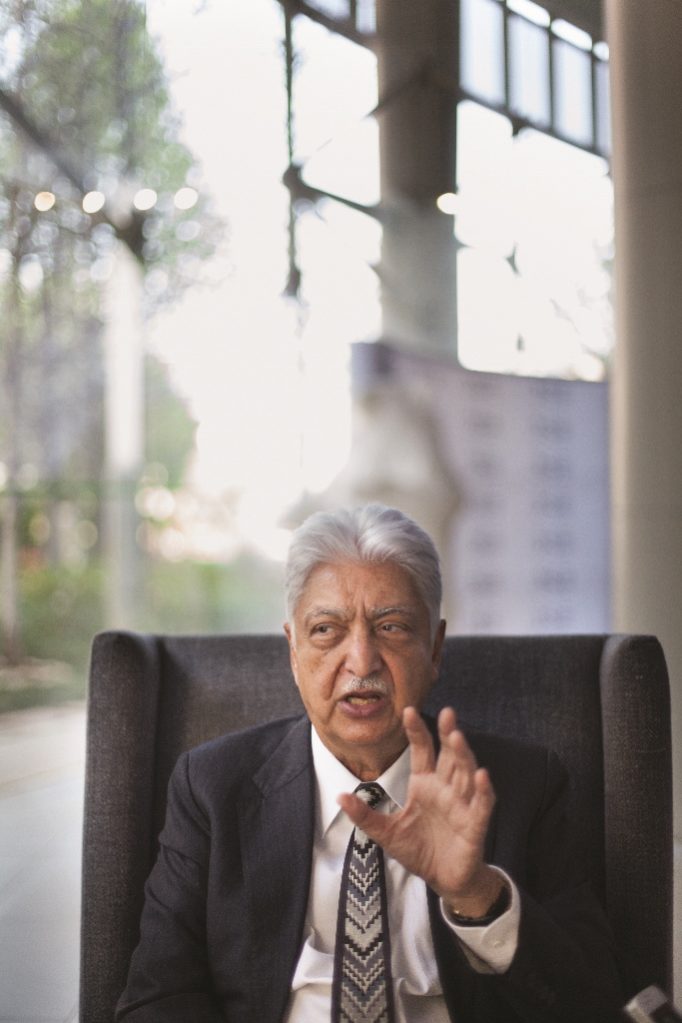Arriving at the Johannesburg Stock Exchange on his first visit to South Africa, Azim Premji, the silver-haired Indian tech tycoon, steps out of a white Mercedes-Benz and greets us warmly. For a billionaire, he’s dressed in an understated black suit, white shirt, and black and white tie. It only takes a few minutes to realize this is a man of few words, and many values. His currency: integrity.
“What is unique about Premji is that there is only black and white, and nothing grey, when it comes to his focus on integrity. And he will pay any price for it,” says Shailendra Singh, the Johannesburg-based general manager and head of Wipro’s Africa business.

INDIA WIPRO
Integrity has been at the heart of the New York-listed Wipro empire the 69-year-old Premji has set up and built in India since 1966. His philosophy: if you have values, success in business will follow.
“His unflinching commitment to values, unflagging philanthropic spirit, deep social conscience and proven success make him one of the tallest business leaders India has produced. Working with him is in many ways a lesson in living one’s life,” says TK Kurien, CEO and Member of the Board at Wipro.
Loading...
Famous for taking India’s information technology services to the world post the country’s liberalization in the 1990s, the Wipro chairman has consistently been on global wealth lists. According to FORBES’ 2014 rich list released in October, Premji is the 45th wealthiest person on the planet with an estimated fortune of $16.5 billion. He is India’s third richest.
Often hailed by Indian media as ‘India’s Bill Gates’, not only for his software riches, but also his headline-grabbing charity donations, Premji has contributed a large chunk of his wealth to social causes, notably education, and is now also ranked as one of the world’s biggest donors.
Premji has donated 21% of his shareholding of Wipro, about $5.5 billion, to the Azim Premji Foundation, set up in 2001 to remedy India’s public education system. Last year, he became the first Indian to sign The Giving Pledge (a commitment by the world’s wealthiest individuals and families to dedicate the majority of their wealth to philanthropy), with the likes of Warren Buffett and Elon Musk.
Premji has also influenced other business leaders in India. His close friend and India’s biotech queen Kiran Mazumdar Shaw, the CMD of Biocon, calls him a torchbearer for philanthropy.
“I have known Azim for several decades and have tremendous respect for his entrepreneurial acumen which is driven by a strong set of ethical values and a quest for global leadership… I have been deeply influenced by him and see him as a mentor in my own philanthropic endeavors. I think he is one of the most inspirational business leaders of our times.”
In 2013, Premji had surprised India’s business world when he said he supported a government proposal to tax the super-rich. Premji has often been written about in the Indian press as a man with a modest lifestyle despite his billions, very much like India’s other tech billionaire, Infosys’ NR Narayana Murthy.
On The Giving Pledge website, Premji quotes his mother, a medical doctor and philanthropist, as the most significant influence in his life. He says he was also influenced by Gandhi’s notion of holding one’s wealth in trusteeship, to be used for the betterment of society and not as if one owned it.
Premji was only 21 when he had to return from the United States (US) to his hometown Bangalore in South India following his father’s untimely death. This was a year before graduating from Stanford, where he was studying engineering. He had to take over the family’s $2-million cooking oil business, Western India Vegetable Products Limited (later renamed Wipro).
Premji focused on building Wipro into a successful and professionally-run organization. He leveraged India’s engineering talent to manufacture computers, turning his family’s hydrogenated vegetable fat business into a leading software services company and outsourcing giant.
Today, the Bangalore-based company is India’s third-largest software exporter and a $7-billion revenue IT, BPO and R&D services conglomerate with a presence in 60 countries. Wipro has been in South Africa for the last three years. The company is currently in the process of identifying universities and colleges it wants to engage with for internship programs across South Africa. Wipro’s 1,600-strong Africa workforce is 40% localized.
Premji’s September visit to South Africa was to explore those opportunities in skills development, using South Africa as a springboard for the rest of Africa. And there will be significant investments in the country.
“South Africa is a high-growth market for us,” says the soft-spoken Premji.
“We will continue to expand and localize here. We have trained about 400 interns here, out of which we have employed 70 percent. We are now planning to engage with the universities in South Africa, upgrade their curriculum, and re-train their teachers. Once trained, we find our interns [in South Africa] to be first-rate… We then give them a three-month rotation on the job and many of them perform as well as people [in India] in terms of output, productivity and commitment to the job.”
Education is top priority for this philanthropist. In India, the Azim Premji University established in 2011 is focused on teaching and research programs.
“I do what I think is the right thing to do vis-a-vis philanthropy. I consider my wealth a fiduciary responsibility and my family supports me on that, importantly,” says Premji, who has been very vocal about the issue of the wealthy giving back.
He has hosted philanthropy meets with Bill Gates in India.
“I have been chairing a movement in India for the last two years, similar to what Bill Gates is doing in the US, trying to encourage people to be more philanthropic. It’s a slow process, but there is a lot of generosity among the new rich professionals who have made it big in terms of start-ups. There is probably more generosity there than amongst the very wealthy.”
Premji believes there is a distinction between the Corporate Social Responsibility (CSR) of a company and personal philanthropy.
“People often get the two [mixed] up. I think there is a trend towards companies trying to build an image with society that they care, trying to be sensitive to the environment in terms of the resources they use to increase their CSR as a percentage of their revenue and as a percentage of their profit. This is a good trend. Some people confuse the company’s CSR with individual philanthropy and say we are doing a lot in the company, we don’t need to do anything ourselves, which is unfortunate.”
In October 2005, Financial Times included Premji in a global list of 25 people dramatically reshaping the way people live, work or think. TIME listed him among the world’s 100 most influential people in April 2004 and again in April 2011, for improving India’s public education. In 2011, he was conferred the Padma Vibhushan, India’s second highest civilian award.
Premji’s two sons are also taking his legacy forward. His eldest, Rishad, has been with Wipro for the last eight years; his youngest, Tariq, is with the Azim Premji Foundation.
Premji has great faith in India’s new Narendra Modi government, and is equally optimistic about Africa.
“India is a key market for us. Indian customers are very demanding in terms of technology, quality and price; you cannot take them for granted. We are [also] very serious about Africa. We [Wipro] are in a very niche area – IT services and solutions. Without question, the Narendra Modi government will forge better ties with Africa.”
Premji promises to be back in South Africa next year. Hopefully, by then, he would have won over the rest of Africa as well.
Loading...





















